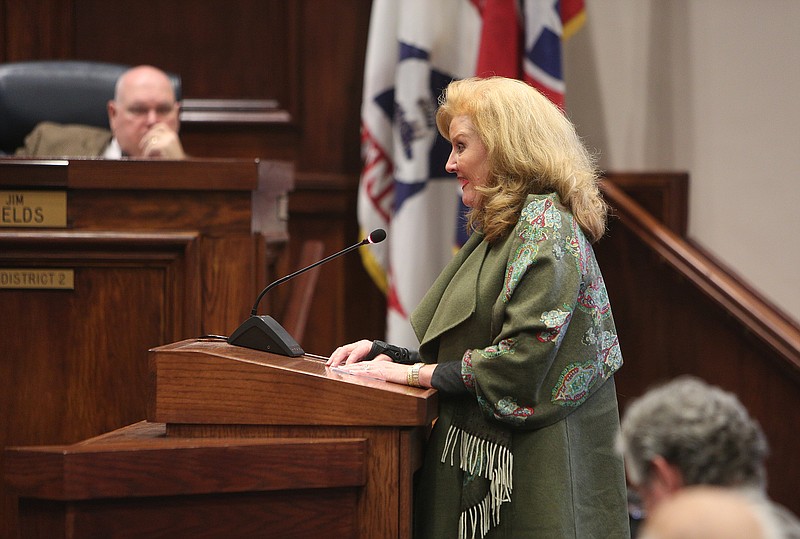NASHVILLE - Tennessee Human Rights Commission chair Robin Derryberry says the board began as early as 2018 to question what appeared to be a "revolving door" among employees at the agency.
But the Signal Mountain businesswoman told the state Senate Government Operations Committee on Wednesday that the commission's then-executive director, Beverly Watt, assured board members that was because agency employees were well trained and made "attractive candidates" for other agencies able to pay more while offering avenues for promotion.
That ended in September, Derryberry told lawmakers, when a commission employee complained in an email to a fellow board member about Watts' alleged abusive management style.
"I immediately made a phone call to the Department of Human Resources to ask about the process" to take action, Derryberry told the panel.
It triggered an HR investigation in which at least seven employees alleged Watts was verbally abusive, fostered a toxic work environment, micromanaged staffers and "ruled by fear."
Watts announced her retirement at a Feb. 9 commission hearing at which members were going to hear the allegations, which she denied.
"I am deeply disappointed in the untrue accusations that have been made against me," Watts said, the Tennessean reported at the time. "I have always tried to lead this organization with dignity and professionalism."
The commission is an independent state agency. It is responsible for enforcing the state's anti-discrimination laws, which prohibit discrimination in housing, employment and public accommodation on the basis of race, color, creed, national origin, religion, sex and disability.
The commission is also tasked with ensuring Tennessee's compliance with Title VI of the Civil Rights Act of 1964, which prohibits discrimination based on race, color and national origin by state agencies receiving federal financial assistance.
In their report, HR investigators wrote that Watts denied the allegations to them as well.
Derryberry told Government Operations Committee members she had made a prior attempt to determine whether anything was amiss in how the agency was being run.
"When one employee abruptly retired, I reached out to her directly. However, she was unwilling to provide any detail on her decision to depart the agency," Derryberry said.
After the allegations were made, Derryberry said, she reached out Oct. 4 to employees to assure them their concerns would be heard and how to file a complaint and that departmental processes would ensure due process for everyone involved.
Watts' Feb. 27 retirement ended the investigation.
"I've assured staff we are a collaborative team moving forward and decisions are made as an organization along with the board," Derryberry said.
Commission members named Muriel Malone Nolen, hired by the agency in 2021, as interim executive director. Nolen spent more than 18 years as a Shelby County assistant prosecutor and once worked in the Hamilton County District Attorney's Office. A University of Tennessee graduate, Nolen later graduated from the University of Memphis Law School.
Senate Judiciary Committee chair Mike Bell, a Riceville Republican who previously chaired the Government Operations Committee, thanked Nolen for taking on the job.
"Your background sounds great. I look forward to there being a fresh start at the commission. And I know you have your hands full. Thank you for taking this on."
Bell cited concerns over what he characterized as "dysfunction" at the commission, noting Watts had received years of "glowing" evaluations.
"I think this committee has seen problems for years," Bell told Derryberry. "Why couldn't you see it?"
Derryberry said that every time the commission went through the evaluation process, the executive director was meeting the goals set by the board.
"They were meeting their quotas that we had," Derryberry said. "And the information we that we received from her showed that we were meeting those."
Derryberry said in a subsequent Times Free Press phone interview that the agency is rebuilding from scratch and the goal is to make the commission the state's "premiere agency" with a focus on education as well as enforcement.
Bell said earlier that he and other committee members for years had been concerned about what he characterized as an "ideological bias" at the agency.
"I asked [Watts] about how many violations a year, and when she said millions, that to me was evidence that she had a bias," Bell told Derryberry. "And she had that bias that had infected the people who were underneath them.
"You called them 'educational.' I called them pep rallies to get employees to sue employers. I went to a couple of them. It was like a pep rally to me to, again, let people know, 'Your rights may have been violated here. Let's look at suing.'"
Bell said he wanted to move the agency to the Tennessee Attorney General's Office as some states have done.
"I'm not going to be around to see that happen," said Bell, who is not seeking re-election. "But maybe somebody will pick up that mantle and move it because I'd like to see, of course, human rights violations prosecuted. But prosecuted from an unbiased perspective."
Julius Sloss, a former Tennessee Human Rights Commission director who now serves on the board, said one of his concerns as a commissioner is that the time to investigate and process a case shouldn't take more than six months.
"We've had a number of cases that lingered for a number of years," Sloss said.
Sloss said the staff is about the same size as it was when he was there 27 years ago and staff was able to process cases in reasonable amounts of time.
"There is no reason why that cannot be happening now," Sloss said.
Contact Andy Sher at asher@timesfreepress.com or 615-255-0550. Follow him on Twitter @AndySher1.
